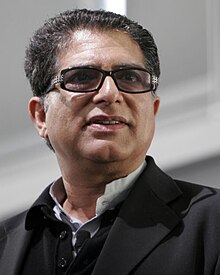Deepak Chopra
Appearance

Deepak Chopra (दीपक चोपड़ा; born October 22, 1946) is a medical doctor born in India, and writer. He has written extensively on spirituality and diverse topics in mind-body medicine. He claims to be influenced by the teachings of Vedanta and the Bhagavad Gita from his native India, and quantum physics. He also said that he has been profoundly influenced by the teachings of J Krishnamurti. His teachings have had a profound influence on the The New Thought Movement which has embraced him in the U.S.
| This article on an author is a stub. You can help out with Wikiquote by expanding it! |
Quotes
[edit]- Most have simply washed their hands of the problem, claiming that the bigotry or bias on Wikipedia is just an unfortunate side-effect that we have to accept. But this is not a trivial unintended consequence of an open source system; bias goes against the very principle of Wikipedia and must be addressed. I have to deal with this bias and misinformation every time a journalist interviews me and references my Wikipedia article. I need to spend the first 30 minutes of interviews to correct all the misleading information from my Wikipedia article... Most of the skeptic editors on my article believe me to be a very dangerous man — and believe that it is Wikipedia’s responsibility to warn the world of how dangerous my ideas are.
- Deepak Chopra, 05/15/2014 Wikipedia, A New Perspective on an Old Problem
- Reagan was on the rise, the anti-war movement had sunk to a low ebb, and the New Age was barely christened when The Aquarian Conspiracy appeared in 1980. Overnight Marilyn Ferguson’s book became famous and sold in the millions. I was a young doctor who had just learned to meditate when I picked up a dog-eared paperback copy at a Catskill spiritual retreat. Ferguson’s message shot through me like electricity: a “benign conspiracy” was bringing about the greatest shift in consciousness in the twentieth century. In one stroke Ferguson unified a movement that seemed like small, isolated outposts on the fringes of respectable society.
Ferguson was a uniter and a futurist. By showing feminists what they shared with environmentalists, New Age spiritual seekers with peace activists, her book inspired a movement that didn’t define the future in terms of technology. She was a one-woman movement for hope. She promised every voice in the wilderness that there were a thousand other voices like theirs.- Quoted in Marilyn Ferguson: An Appreciation, Huffington Post, (7 November 2008)
- It’s time to rescue "intelligent design" from the politics of religion. There are too many riddles not yet answered by either biology or the Bible, and by asking them honestly, without foregone conclusions, science could take a huge leap forward.
- To say that Nature displays intelligence doesn't make you a Christian fundamentalist. Einstein said as much, and a fascinating theory called the anthropic principle has been seriously considered by Stephen Hawking, among others.
- "Intelligent Design Without the Bible" in The Huffington Post (23 August 2005)
- Laughter is Humanity's mechanism to escape suffering.
- "Iconoclasts" Sundance Channel Original Series episode 3.03 (Original Air Date: 8 November 2007)
- Buddha didn’t teach that life hurts because of pain; it hurts because the cause of suffering hasn’t been examined.
- The Book of Secrets: Unlocking the Hidden Dimensions of Your Life (2004)
- Every time you are tempted to react in the same old way, ask if you want to be a prisoner of the past or a pioneer of the future. The past is closed and limited; the future is open and free.
- The Path to Love: Spiritual Strategies for Healing, p. 170
- To make the right choices in life, you have to get in touch with your soul. To do this, you need to experience solitude, which most people are afraid of, because in the silence you hear the truth and know the solutions.
- The Book of Secrets: Unlocking the Hidden Dimensions of Your Life (2004)
- At this moment, you are seamlessly flowing with the cosmos. There is no difference between your breathing and the breathing of the rain forest, between your bloodstream and the world’s rivers, between your bones and the chalk cliffs of Dover.
- The Book of Secrets: Unlocking the Hidden Dimensions of Your Life (2004)
Quotes about Deepak Chopra
[edit]- In the case of Chopra, our analysis need not be very profound: he is a spiritual businessman, and will never take a principled stand if it comes in the way of his business success. A soft and conformistic stance gives him easier access to the Western audience, as well as to a large chunk of the Hindu diaspora. The factor “inferiority complex” plays a part too. It makes Hindu Gurus suddenly feel superior when they have exchanged Hindu Dharma for the American mainstream. But mainly it is a pragmatic calculation. They don’t expect most of the kind of people they attract to be very interested in the intricacies of philosophy. Most of them have run away from Christianity, which is not just irrational, it is also demanding, morally and to an extent even intellectually. So they want something that is not too complicated nor too demanding. What they ultimately get is what they had wanted upon entry: an easy, watered-down version of Hindu Dharma.
- Koenraad Elst. Interview with Adity Sharma. "Interview with Dr. Koenraad Elst – Part (III)." Hindu Post. 2017-09-15.


